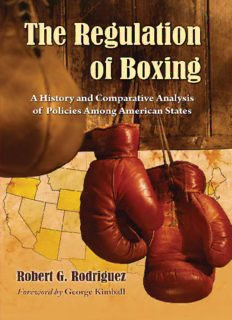
Regulation of Boxing: A History and Comparative Analysis of Policies Among American States PDF
Preview Regulation of Boxing: A History and Comparative Analysis of Policies Among American States
The Regulation of Boxing This page intentionally left blank The Regulation of Boxing A History and Comparative Analysis of Policies Among American States ROBERT G. RODRIGUEZ Foreword by GEORGE KIMBALL McFarland & Company, Inc., Publishers Jefferson, North Carolina, and London All photographs are from the author’s collection unless otherwise credited. LIBRARYOFCONGRESSCATALOGUING-IN-PUBLICATIONDATA Rodriguez, Robert G. The regulation of boxing : a history and comparative analysis of policies among American states / Robert G. Rodriguez ; foreword by George Kimball. p. cm. Includes bibliographical references and index. ISBN 978-0-7864-3862-4 softcover : 50# alkaline paper 1. Boxing—Law and legislation—United States—States. 2. Boxing—Safety regulations—United States—States. 3. Boxers (Sports)—Legal status, laws, etc.—United States— States. 4. Boxing—Safety regulations. 5. Boxers (Sports)— Legal status, laws, etc. I. Title. KF3989.R63 2009 344.73'099—dc22 2008046353 British Library cataloguing data are available ©2009 Robert G. Rodriguez. All rights reserved No part of this book may be reproduced or transmitted in any form or by any means, electronic or mechanical, including photocopying or recording, or by any information storage and retrieval system, without permission in writing from the publisher. On the cover: Boxing image ©2008 Clipart; Map image ©2008 Shutterstock. Manufactured in the United States of America McFarland & Company, Inc., Publishers Box 611, Jefferson, North Carolina 28640 www.mcfarlandpub.com To my children, Gabriela and Diego This page intentionally left blank A CKNOWLEDGMENTS This book is a revised and updated version of the doctoral dissertation I completed at the University of Kansas in 2005. Anyone who has earned a Ph.D. has had professors that should be thanked for their crucial guidance at various stages of their academic career. I would never have made it to KU if it hadn’t been for the advice I received as an undergraduate from University of California at Irvine professor Caesar Sereseres and the Summer Academic Enrichment Program he coordinates. Dr. Sereseres and the SAEP were the key factors in my decision to pursue a graduate degree. At the University of Kansas, I am indebted to several people who have taught and advised me throughout the years. Professor Chico Herbison served as my unofficial academic, professional and life advisor. Likewise, Dr. Ngondi Kamatuka, director of Educational Opportunity Programs at the university, has been my role model for over a decade. My doctoral dissertation commit- tee was an outstanding conglomeration of several nationally recognized fac- ulty members. Historian Bill Tuttle and political scientists Al Cigler and Burdett Loomis have each published books that are used in college classrooms throughout the United States, and Don Haider-Markel is one of the most productive faculty members in the political science department. Above all, I owe an eternal debt of gratitude to Dr. Mark Joslyn, my dissertation advi- sor. Words cannot accurately describe the profound appreciation I have for Dr. Joslyn’s support, guidance and advice. My dissertation, and ultimately this book, would not have been possible without him. With all of the academic, professional and personal advice I gained from the aforementioned individuals, it should be made clear that the road to com- pleting this book has not been a solitary endeavor. University of Kansas col- lege student and boxing fanatic Fernando Yaluk assisted me with the transcription of interviews, geography graduate student Yoshinori Nakazawa produced the outstanding maps and my colleague Allyson Flaster helped for- mat the bibliography and notes. My family has also been instrumental to my success. “Pirucho” vii ACKNOWLEDGMENTS Rodriguez, an uncle who passed away in early 2008, imparted to me more wisdom than he could imagine. Among the gems he taught me early on was the importance of family, for I could have all the degrees, possessions and money in the world, yet if I had no one to share it with then I would have nothing. Most people born to Latin American parents with a minimal level of education and empty bank accounts never get the opportunity to advance in society. In my case, however, I had the good fortune to be born in a coun- try where if you work hard and attain an education, you can progress profes- sionally and economically. The American dream envisioned for my brothers (Edward and Mark) and me by our Argentine parents became our reality, and I want to thank my mother and father for making the decision to immigrate to the United States over forty years ago. My father, Marcos, deserves a spe- cial mention for introducing me to the magnificent sport of boxing, and my mother, Gladys, continues to inspire me from above. And finally, I wish to acknowledge my wife, Irina, who has been by my side since I embarked on my quest to earn my Ph.D. viii T C ABLE OF ONTENTS Acknowledgments vii Foreword by George Kimball 1 Preface 7 Introduction 13 1 • A History of Boxing Regulations 23 2 • Data Analysis 63 3 • Case Study: Boxing in Nevada 108 4 • Case Study: Boxing in Kansas 151 5 • An Alternative Model? Boxing in Argentina 163 Conclusion 190 Chapter Notes 205 Bibliography 213 Index 215 ix
Description: